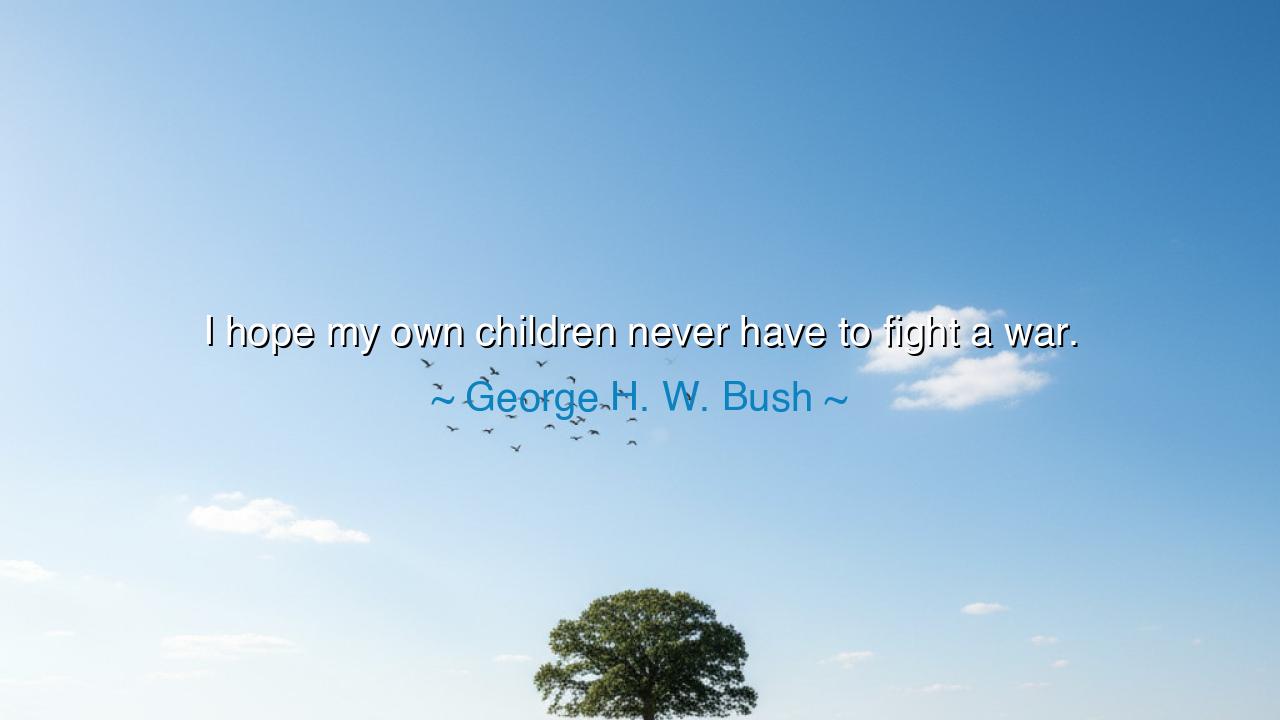
I hope my own children never have to fight a war.






The words of George H. W. Bush, “I hope my own children never have to fight a war,” echo across generations like the prayer of a weary soldier standing beneath a blood-red dawn. It is the voice of one who has seen the cost of war, not in numbers or victories, but in faces, in silence, in graves that never stop growing. These are not the words of weakness, but of wisdom—the wisdom that comes from gazing upon destruction and choosing peace. For those who have truly walked through battle know that war is not glory, but grief; not triumph, but tragedy disguised as duty.
Bush spoke from experience, not abstraction. As a young man, he served as one of the youngest pilots in World War II, flying missions over the Pacific. He had looked into the eyes of death, seen comrades fall, and lived with the haunting knowledge that survival often depends more on fate than on valor. When he later became a leader of nations, the echoes of those skies and those losses still lived in him. Thus, his hope that his children—and by extension, the children of all humanity—would never need to fight, was not a dream of cowardice, but of compassion. It was a father’s plea to break the endless wheel of suffering that turns generation after generation.
In his words, we hear the ancient struggle of mankind—the yearning to outgrow the cycle of violence that has marked our history since the dawn of civilization. From the warriors of Troy to the soldiers of Normandy, every age has produced fathers who prayed that their sons would not need to take up the sword. And yet the world forgets too quickly. Each new generation is taught the pride of war before it learns the pain of it. The wisdom of Bush’s quote is that he recognizes this cycle, and seeks to end it not through power, but through hope—a hope that peace, once learned, could finally become heritage.
History bears witness to this longing. Think of Dwight D. Eisenhower, who commanded the Allied forces to victory in World War II, yet when he became President, warned his people of the military-industrial complex, saying that the very tools of war, if unchecked, could enslave humanity in perpetual conflict. Like Bush, Eisenhower’s will for peace was not born from softness, but from strength—a strength forged in the understanding that the greatest victory is to prevent war, not to win it. The truest heroes, it seems, are those who fight so that others may never need to.
And yet, peace is not a passive dream—it demands courage equal to that of any battlefield. To say, “I hope my children never have to fight a war,” is not to say that one will not defend justice when required. Rather, it is to wish for a world so wise, so compassionate, that justice itself no longer requires violence. Such a world cannot be built by generals alone, but by teachers, artists, and everyday souls who choose understanding over vengeance. The bravery of peace is quieter, but deeper—it is the courage to forgive, to dialogue, to build bridges over blood-stained ground.
The emotional power of Bush’s words also lies in their universal truth: every parent’s heart trembles at the thought of their child marching into war. In that trembling lies the purest form of love—the kind that sees beyond nations and borders, beyond race or creed. For when a father says, “I hope my children never have to fight,” he speaks for all humanity, acknowledging that beneath the armor of politics and ideology, we are one family yearning for safety, for peace, for the chance to grow old without fear.
The lesson, then, is this: peace must be fought for as fiercely as war, but with different weapons—wisdom, empathy, and courage of conscience. The call of our time is to raise a generation that does not glorify war, but understands its cost. Let each of us strive to be the peacemakers in our homes, our communities, our nations. Let us learn to see the humanity even in our enemies, for that vision is the seed from which peace may finally grow.
So remember the prayer of the old soldier, George H. W. Bush: “I hope my own children never have to fight a war.” Let those words live not as nostalgia, but as prophecy. Let us carry them forward until they are no longer a hope, but a truth fulfilled—until the day comes when no parent must send their child to the fields of battle, and the songs of war are replaced forever by the hymns of peace.






AAdministratorAdministrator
Welcome, honored guests. Please leave a comment, we will respond soon